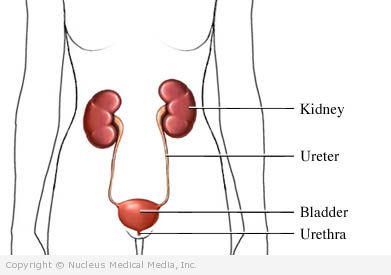(Bladder Infection)
Acute cystitis – Definition
Cystitis is an infection of the bladder. The bladder is the part of the urinary tract that collects the urine from the kidneys.
Acute cystitis – Causes
The urinary tract normally contains no microorganisms. However, sometimes bacteria or yeast from the lower gastrointestinal tract or rectal area enter the urinary tract. This usually happens through the urethra (tube that allows urine to pass out from the bladder). When bacteria or yeast cling to the urethra, they can multiply and infect the urethra. They can then travel up and infect the bladder.
Most cases of cystitis are caused by bacteria from the rectal area. In women, the rectum and urethra are fairly close to each other. This makes it relatively easy for bacteria to make their way into the urethra. Some women develop cystitis after a period of frequent sexual intercourse. This happens because bacteria enter the urethra during sex and cause infection.
Acute cystitis – Risk Factors
A risk factor is something that increases your chance of getting a disease or condition.
Risk factors include:
- Sex: female
- Being sexually active
- Using a diaphragm for birth control
- Condom use — This may also increase infection rates in women, especially when Nonoxynol-9-coated condoms are used.
- Menopause
- Abnormalities of the urinary system, including vesicoureteral reflux or polycystic kidneys
- Paraplegia and other neurologic conditions
- Sickle-cell disease
- History of kidney transplant
- Diabetes type 1 and type 2
- Kidney stones
- Enlarged prostate (in men)
- Weak immune system
- Bladder catheter in place or recent instrumentation of the urinary system
- Tight underwear and clothing
- Chemicals in soaps, douches, and lubricants
Acute cystitis – Symptoms
Symptoms of cystitis vary from person-to-person and can range from mild to severe. They include:
- Frequent and urgent need to urinate
- Passing only small amounts of urine
- Pain in the abdomen, pelvic area, or low back
- Burning sensation during urination
- Leaking urine
- Increased need to get up at night to urinate
- Cloudy, bad-smelling urine
- Blood in the urine
- Low-grade fever
- Fatigue
Acute cystitis – Diagnosis
The doctor will ask about your symptoms and medical history. A physical exam will be done. A sample of your urine will be tested for blood, pus, and bacteria. If bacteria are present in the urine, you will likely be diagnosed with cystitis.
Children and men who develop cystitis may require additional testing. The doctor will use a cystoscope to check for structural differences in the urinary system that increase the likelihood of infection.
Acute cystitis – Treatment
Bacterial cystitis is treated with antibiotic drugs. Antibiotics (usually trimethoprim/sulfamethoxazole, nitrofurantoin, or fluoroquinolones) will be prescribed for at least 2-3 days and perhaps for as long as several weeks. The length of the treatment depends on the severity of the infection and your personal history. You will probably start to feel better after a day or two. However, it is important that you complete the entire course of medication. Otherwise, the infection is likely to return. You may have your urine checked after you finish taking the antibiotic. This is to make sure that the infection is gone.
If you experience more infections, your doctor may prescribe stronger antibiotics or have you take them for a longer period of time. He or she may also recommend that you take low-dose antibiotics as a preventive measure, either daily or after sexual intercourse. If you still experience recurrent infections, you may be referred to a specialist.
Phenazopyridine (Pyridium) is a medicine that decreases pain and bladder spasms. Taking phenazopyridine will turn your urine and sometimes your sweat an orange color. This medication is generally available without a prescription. It can usually relieve symptoms effectively while waiting for medical treatment to work.
Acute cystitis – Prevention
Here are some steps you can take to keep bacteria out of your urinary tract:
- Drink plenty of liquids.
- Include cranberry juice in your diet. Some studies support the use of cranberry juice to prevent urinary tract infections.
- Urinate when you have the urge. Do not resist it.
- After sexual intercourse, empty your bladder and then drink a full glass of water.
- Wash genitals daily.
- If you’re a woman, always wipe from the front to the back after having a bowel movement.
- Avoid using douches and feminine hygiene sprays.
- Avoid wearing tight underwear or clothing.

